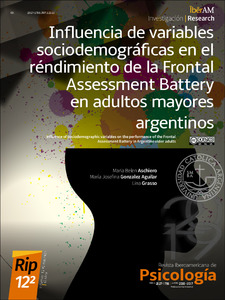Por favor, use este identificador para citar o enlazar este ítem:
https://repositorio.uca.edu.ar/handle/123456789/9926| Título: | Influencia de variables sociodemográficas en el réndimiento de la Frontal Assessment Battery en adultos mayores argentinos Influence of sociodemographic variables on the performance of the Frontal Assessment Battery in Argentine older adults |
Autor: | Aschiero, María Belén González Aguilar, María Josefina Grasso, Lina |
Palabras clave: | ADULTOS MAYORES; ENVEJECIMIENTO; FUNCIONES EJECUTIVAS; FUNCION COGNITIVA; EVALUACION PSICOLOGICA; FACTORES SOCIALES | Fecha de publicación: | 2019 | Editorial: | Kimpres | Cita: | Aschiero, M. B., Gonzalez Aguilar, M. J., Grasso, L. Influencia de variables sociodemográficas en el réndimiento de la Frontal Assessment Battery en adultos mayores argentinos [en línea]. Revista Iberoamericana de Psicología. 2019, 12(2). doi:10.33881/2027-1786.rip.12211. Disponible en: https://repositorio.uca.edu.ar/handle/123456789/9926 | Resumen: | Resumen: Introducción. La Frontal Assesment Battery
(FAB) es una herramienta de screening
de valoración rápida de las funciones
ejecutivas. Estudios previos evidencian que
variables sociodemográficas como la edad,
el sexo y el nivel educativo podrían influir
en el rendimiento de la FAB. El objetivo del
estudio es analizar, en adultos mayores
argentinos provenientes de la población
general y sin deterioro cognitivo (evaluados
según el Minimental, pruebas de fluidez
verbal semántica y fonológica y el Test del
Reloj) si existe diferencia en la FAB a partir
de dichas variables. Metodología. Se analizó
el rendimiento de 145 adultos mayores
provenientes de la población general y sin
deterioro cognitivo entre 60 y 90 años. Se
realizaron estudios de diferencias de medias
(t de Student y ANOVA), análisis univariante
de la varianza, correlaciones (r de Pearson)
y regresiones lineales simples para analizar
la influencia de la edad, el sexo, el nivel
educativo y el rendimiento cognitivo en la
FAB. Resultados. Se observaron diferencias
estadísticamente significativas en el puntaje
total de la FAB en función del nivel educativo,
pero no en función de la edad, ni el sexo.
Asimismo, se encontró que el puntaje de la
FAB se correlacionó con otras pruebas de
screening cognitivo, como el Minimental,
el Test del Reloj y fluidez verbal (fonológica
y semántica). Conclusiones. El presente
estudio presenta resultados que señalan la
importancia de considerar el nivel educativo
en la valoración de la FAB. Abstract: Introduction. The Frontal Assesment Battery (FAB) is a screening tool for a quick assessment of executive functions. Previous studies show that sociodemographic variables such as age, sex and educational level may influence the performance of the FAB. The objective of this study is to analyze, in elderly Argentines from the general population and without cognitive impairment (assessed according to the Minimental, semantic and phonological verbal fluency tests and the Clock Test) if there are differences in the FAB explained by these variables. Methodology. The performance of 145 elderly adults from the general population without cognitive impairment between 60 and 90 years was analyzed. Studies of mean differences (Student's t-test and ANOVA), univariate analysis of variance, correlations (Pearson's r) and simple linear regressions were performed to analyze the influence of age, sex, educational level and general cognitive performance in the FAB. Results. Statistically significant differences were observed in the total score of the FAB according to the educational level, but not according to age or sex. It was also found that the FAB score correlated with other cognitive screening tests, such as the Minimental, the Clock Test and verbal fluencies (phonological and semantic). Conclusions. The present study presents results that indicate the importance of considering the educational level in the assessment of the FAB. |
URI: | https://repositorio.uca.edu.ar/handle/123456789/9926 | ISSN: | 2027-1786 (impreso) 2500-6517 (online) |
Disciplina: | PSICOLOGIA | DOI: | 10.33881/2027-1786.rip.12211 | Derechos: | Acceso abierto | Fuente: | Revista Iberoamericana de Psicología. 2019, 12 (2) |
| Aparece en las colecciones: | Artículos |
Ficheros en este ítem:
| Fichero | Descripción | Tamaño | Formato | |
|---|---|---|---|---|
| influencia-variables-sociodemograficas-rendimiento.pdf | 1,25 MB | Adobe PDF |  Visualizar/Abrir |
Visualizaciones de página(s)
179
comprobado en 30-abr-2024
Descarga(s)
386
comprobado en 30-abr-2024
Google ScholarTM
Ver en Google Scholar
Altmetric
Altmetric
Este ítem está sujeto a una Licencia Creative Commons

